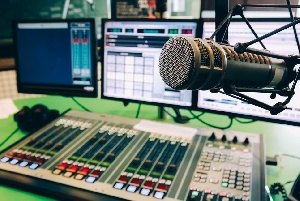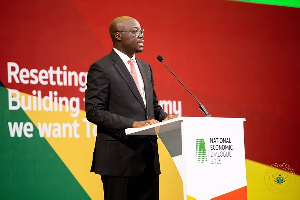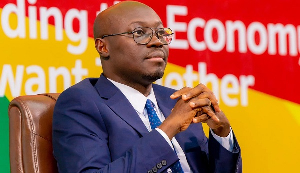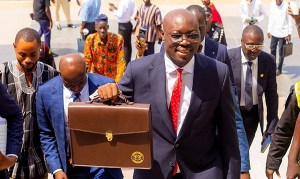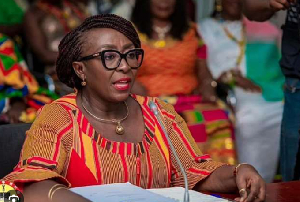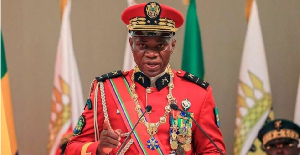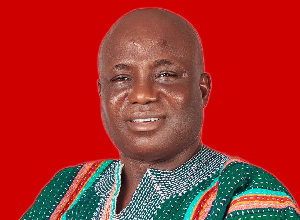The 2018 World Press Freedom Index has just been released by Reporters Sans Frontières, and once again, the weak performance of African countries on that list cannot be ignored.
Only four African countries are ranked among the top 30 countries in terms of media freedom, with Ghana, Namibia, South Africa, and Cape Verde placing 23rd, 26th, 28th, and 29th, respectively.
The media has, over the years, made invaluable contributions to Africa’s democratic journey. It has been instrumental in carrying the voice of the voiceless, unraveling sociopolitical and economic issues, as well as discussing and helping proffer solutions.
It has also played a role in scrutinizing governments, exposing mistakes and malfeasance, and thereby contributing to greater transparency and public- sector accountability. While these media achievements are worth celebrating, the recent ranking paints a rather gloomy picture of media censorship and hostility to press freedom in most African countries.
Do Africans want a free media? According to Afrobarometer’s Round 6 surveys, on average across 36 African countries, a little more than half (54%) of the population express support for an unfettered media (see Figure 1). Popular support for media freedom varies widely across countries.
The idea that “the media should have the right to publish any views and ideas without government control” is endorsed by a majority in 22 countries, but it is a minority position in 10 countries. Fewer than one-third of Senegalese and Cameroonians express support for uncensored media.
Whilst a clear majority of respondents with any level of education express support for free media, it is a minority position for those without formal education. Support for unfettered media varies across the sub-regions – it’s strongest among Southern Africans (60%) and weakest in West Africa (49%).
Figure 1: Support for a free media | 36 countries | 2014/2015
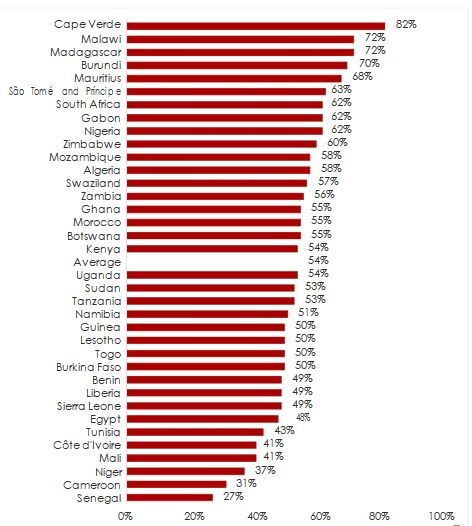
Statement 1: The media should have the right to publish any views and ideas without government control.
Statement 2: The government should have the right to prevent the media from publishing things that it considers harmful to society.
(% who “agree” or “agree very strongly” with Statement 1)
A solid majority (69%) want to see the news media scrutinize and keep the government on its toes by constantly investigating and reporting on government mistakes and corruption. Indeed, about six in 10 citizens (59%) believe that the media is effective in this watchdog role (Figure 2).
Mauritians (87%), South Africans (82%), and Tunisians (81%) are more than twice as likely to see their media as effective as are citizens of Madagascar (30%), Côte d’Ivoire (35%), and Gabon (35%).
Legal access to public information is vital to the work of the media in promoting transparency and social accountability. While it is gratifying that about 22 African countries have passed Right to Information laws, Ghana, touted as one of Africa’s strongest democracies, has had a Right to Information bill sitting in Parliament for about 17 years.
Figure 2: Is media effective in its watchdog role? | 36 countries | 2014/2015
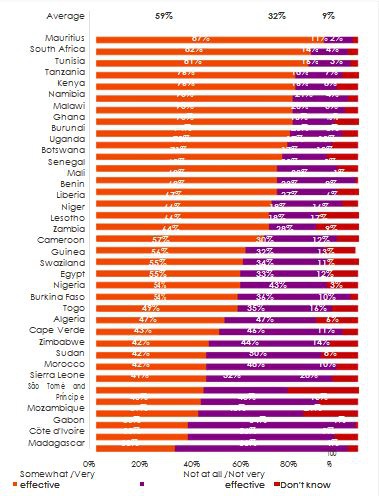
Respondents were asked: In this country, how effective is the news media in revealing government mistakes and corruption?
But the fight for press freedom is hampered by public perceptions of unprofessionalism and breaches of media ethics among journalists. Almost four in 10 Africans (36%) say the media “often” or “always” abuses its freedom by printing or saying things that it knows are not true (Figure 3) – a proportion comparable to the 42% who endorse the statement that “the government should have the right to prevent the media from publishing things that it considers harmful to society.”
Figure 3: Media abuses its freedom | 36 countries | 2014/2015
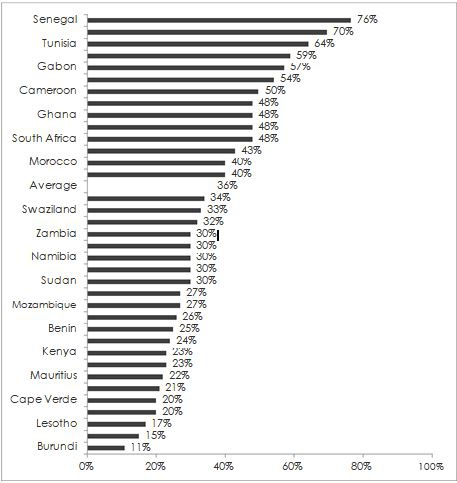
Respondents were asked: In your opinion, how often, in this country, does the news media abuse its freedoms by printing or saying things it knows are not true? (% who say “often” or “always”)
A free press in a democratic system legitimizes power through accountability and criticism, provides a forum for the competition of ideas and interests, and enables social inclusion and civic participation. In essence, there can be no true democracy without a free press.
By the same token, it can be argued that an unethical press poses a threat to democratic stability. Both journalists and governments have an obligation to work to protect media freedom and public access to information.
If African countries seek to strengthen democratic governance, they must work to provide an enabling environment where free, high-quality media can thrive.
The author is the Afrobarometer regional communications coordinator for Anglophone West Africa, based at the Ghana Center for Democratic Development (CDD-Ghana).
email: jappiah@afrobarometer.org
John P. Frinjuah is a research officer at CDD-Ghana. j.frinjuah@cddgh.org
Opinions of Friday, 4 May 2018
Columnist: Josephine Appiah-Nyamekye

